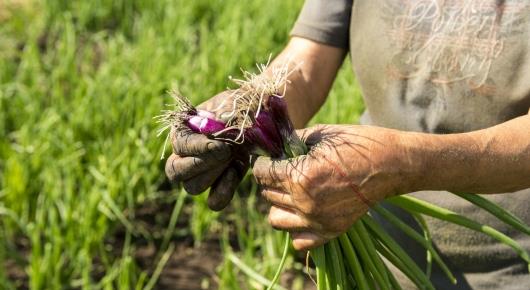Countries bet on agroecology for sustaining natural resources and rural livelihoods

Farmers are facing growing pressure to provide an increasing amount of healthy and nutritious food at low environmental cost. Combining traditional farming methods with modern systems is on-trend as well.
Agroecology can contribute greatly to both while also ensuring consideration of the social aspects of sustainable food systems. However, the concept is neither widely known nor widespread in the Western Balkans, the Caucasus and Central Asia.
To this end, FAO has started a dialogue in the region and organized a two-day event for the Western Balkans and the Caucasus to raise awareness on the multiple benefits of agroecology.
Starting today, the event provides a forum for discussion and knowledge exchange. The first event of its kind, it builds on active participation before and during the workshop to gather information from participants and feed it into the development of a regional work plan on agroecology.
What is agroecology?
Using ecological concepts and principles, agroecology optimizes interactions among plants, animals, humans and the environment to build sustainable and fair food systems. It also has a strong social component, aiming to return farmers to the centre of the food system.
This approach counters the view that agriculture is an enemy of the environment; it shows that a productive farming sector can provide environmental benefits and services while creating rural employment and sustaining livelihoods.
“Agroecology is a dynamic concept, built on traditional and local solutions and knowledge harmonically combined with scientific knowledge and innovation,” said Carolina Starr, an FAO expert on agroecology. “We have engaged with countries to together define how this agenda can be implemented. What we hear from them will shape FAO’s work and priorities on agroecology through the 2020–21 biennium.”
Agroecology offers a way for countries to implement the Sustainable Development Goals in an integrated manner, contributing directly to at least 10 of the 17 goals. Agroecological systems target local markets and promote closer links between producers and consumers. Agroecology also promotes more inclusive governance, with greater participation in decision-making. It can rebalance power relations in food systems, strengthen family farming and ensure a better quality of life in rural areas.
At the Thirty-first Regional Conference, countries of Europe and Central Asia requested that FAO incorporate and bolster work on agroecology in the context of the United Nations Decade of Family Farming (2019–2028), Starr said.
Participants of the workshop include representatives of governments, civil society, food producers, and academia from Albania, Armenia, Bosnia and Herzegovina, Georgia, Kosovo*, Montenegro, Republic of Moldova, North Macedonia, and Serbia. Participants were consulted prior to the event through an online questionnaire to take stock on the status of agroecology in the region and tailor the agenda to their exact needs.
Promoting agroecology is part of a wider FAO effort to promote sustainable food systems.
*References to Kosovo shall be understood to be in the context of Security Council Resolution 1244 (1999).
3 April 2019, Tirana, Albania
